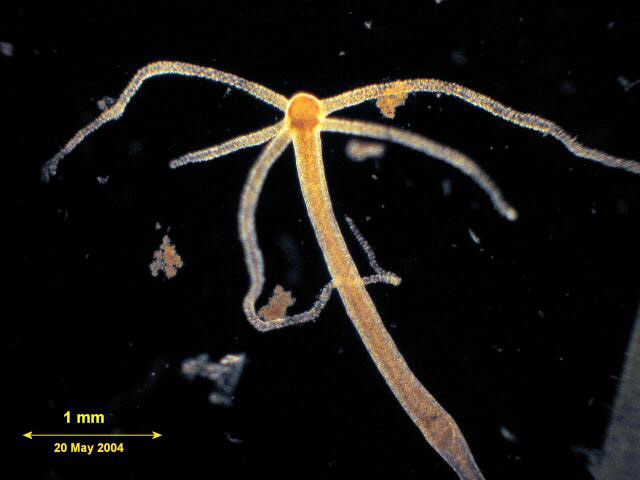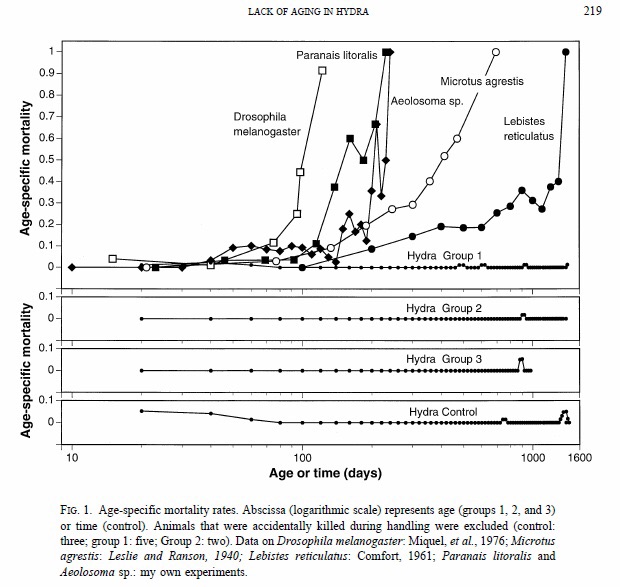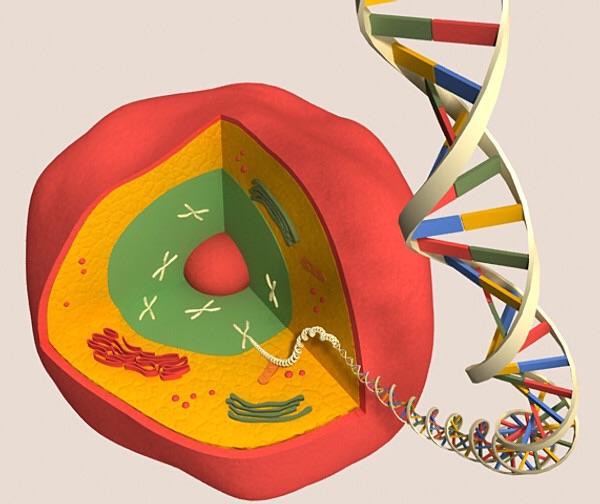It looks like you're using an Ad Blocker.
Please white-list or disable AboveTopSecret.com in your ad-blocking tool.
Thank you.
Some features of ATS will be disabled while you continue to use an ad-blocker.
share:
Recently I've become re-interested in the topic of immortality in humans. I was watching a Youtube video from the channel "Alltime10s" about ten
animals which could hold the key to human immortality. If you wish to see it, the video will be posted below ...
Basically, the video goes through different animal species such as the lobster (never have been observed to die except from predation or disease), the naked mole rat (longest lifespans of any rodent and almost impervious to cancer), the aptly named Immortal Jellyfish (able to revert back to a "polyp" when afflicted with disease, basically restarting it's life as a newborn), and the incredible Hydra Magnipapillata (able to regrow the telomeres at the ends of their chromosomes, essentially preventing them suffering from old-age). All of these organisms are seemingly miraculous in their own right, but today we'll be focusing on the latter animal in my abridged description: the Hydra.

The Curious Case of the Hydra Magnipapillata
"Hydra Magnipapillata" (otherwise known as the "Hydra Vulgaris" or the "Hydra attenuata") is apart of the order Hydridae, the family Anthoathecata, and the class Hydrozoa. It's most similar to a jellyfish in appearance and is only 5mm to 15mm long.
It can reproduce sexually or through budding (asexually). But the Hydra has another way it can multiply itself and that is through regeneration. Regeneration is the ability for an organism to create an entirely separate individual or group of individuals from the original organism's pieces if part of that organism's body is severed.
Although regeneration is a marvelous ability of the Hydra, it is not unique. Starfish and Flat-worms, for instance, also contain this reproductive mechanism. What makes the Hydra so unique, however, is it's way of preventing natural death altogether.
Scientists at the University of Denmark concluded, according to a Daily Mail article which brought up the subject, that this species of Hydra is "almost completely unaffected by the aging process".
Daily Mail Article: www.dailymail.co.uk...

This was far from the only media article concerning the Hydra's immortality, but this immortal phenomenon is far from only being mainstream "word-on-the-street". Indeed, it has been studied by scientists for over three centuries. Only recently, however, has this Hydra's negligible senescence (the lack of aging in certain organisms) been thoroughly researched and studied.
Many of the studies I looked up online are beyond my understanding, but this particular university article on the subject explains the situation in predominantly layman's terms for anyone desiring to learn more about this topic...
Georgia Tech; the Hydra
In part of the article, a chart is shown comparing the age-specific mortality of the Hydra to species of similar organisms which lack the Hydra's apparent negligible-senescence:

From deducing the statistics within the chart, we can clearly see the hydra groups greatly outperform all other tested species in terms of death by aging. The small bumps in the hydra lines indicating deaths are likely due to changing conditions within the laboratory and various age-unrelated diseases. They were included in the chart due to the fact that they were unconfirmed to be directly caused by senescence. Even so, the findings are absolutely astounding. Even with the imperfect conditions within the laboratory the study took place in, barely any hydras died after more than four years of experimentation. This study helps prove hydras never age whatsoever, to put things very bluntly.
But the hydra is only one of the more exceptional cases of immortality. There are several more different species that have been studied to possess traits important to eventually creating an immortal human. From years of study into the genomes of these creatures, researchers have narrowed down the two most important genetic factors in prolonging life: Stem Cells and Telomeres
"Stem Cells and Telomeres: The Keys to Human Immortality?"

"Stem Cells" are probably the most familiar to you all due to the mainstream media touting it's amazing implications for medical science and even immortality. Stem cells, to put it simply, are one of the most fundamental building blocks of every organ or system within a living body. To put it even more simply, stem cells are cells that can turn into any other cell imaginable. They can also be used to regenerate damaged tissues within the body when needed.
According to the National Institutes of Health, a well-respected and sought-after government organization, stems cells ...
The bolded point is the most important for the topic of this thread. If we could devise a stem-cell system which could create any tissue-cell imaginable, we could essentially make humanity immortal. Think of the possibilities: We could replace dying organs within patients with new, completely compatible organs created using that patient's stem cells. Disfigured victims of accidents could replace the damaged parts on their body with entirely new ones grown within a lab. Anything under-the-sun a patient needs "repairing" can be done so without a doubt.
The NIH's entry of the subject explains stem cells much more in-depth than I ever could, while touting the positive consequences of implementing wide-spread usage of such a system:
National Institutes of Health
Then, there's "Telomeres", the lesser-known yet equally valuable counterpart of research into immortality. Telomeres are the ends of chromosomes which protect DNA from shortening after dividing. In turn, the telomeres shorten after each subsequent DNA division. The shortening of the telomeres makes genetic mutations and illnesses more likely over time, causing the ill-effects of aging within most living things.
However, there is a way for telomeres to regenerate. Telomerase is an enzyme which replenishes the shortened telomeres of young cells after DNA division. In most living things, the storage of telomerase within the body eventually runs out, and the telomeres get shorter as a result. (continued in next post in this thread...)
Basically, the video goes through different animal species such as the lobster (never have been observed to die except from predation or disease), the naked mole rat (longest lifespans of any rodent and almost impervious to cancer), the aptly named Immortal Jellyfish (able to revert back to a "polyp" when afflicted with disease, basically restarting it's life as a newborn), and the incredible Hydra Magnipapillata (able to regrow the telomeres at the ends of their chromosomes, essentially preventing them suffering from old-age). All of these organisms are seemingly miraculous in their own right, but today we'll be focusing on the latter animal in my abridged description: the Hydra.

The Curious Case of the Hydra Magnipapillata
"Hydra Magnipapillata" (otherwise known as the "Hydra Vulgaris" or the "Hydra attenuata") is apart of the order Hydridae, the family Anthoathecata, and the class Hydrozoa. It's most similar to a jellyfish in appearance and is only 5mm to 15mm long.
It can reproduce sexually or through budding (asexually). But the Hydra has another way it can multiply itself and that is through regeneration. Regeneration is the ability for an organism to create an entirely separate individual or group of individuals from the original organism's pieces if part of that organism's body is severed.
Although regeneration is a marvelous ability of the Hydra, it is not unique. Starfish and Flat-worms, for instance, also contain this reproductive mechanism. What makes the Hydra so unique, however, is it's way of preventing natural death altogether.
Scientists at the University of Denmark concluded, according to a Daily Mail article which brought up the subject, that this species of Hydra is "almost completely unaffected by the aging process".
Daily Mail Article: www.dailymail.co.uk...

This was far from the only media article concerning the Hydra's immortality, but this immortal phenomenon is far from only being mainstream "word-on-the-street". Indeed, it has been studied by scientists for over three centuries. Only recently, however, has this Hydra's negligible senescence (the lack of aging in certain organisms) been thoroughly researched and studied.
Many of the studies I looked up online are beyond my understanding, but this particular university article on the subject explains the situation in predominantly layman's terms for anyone desiring to learn more about this topic...
Georgia Tech; the Hydra
In part of the article, a chart is shown comparing the age-specific mortality of the Hydra to species of similar organisms which lack the Hydra's apparent negligible-senescence:

From deducing the statistics within the chart, we can clearly see the hydra groups greatly outperform all other tested species in terms of death by aging. The small bumps in the hydra lines indicating deaths are likely due to changing conditions within the laboratory and various age-unrelated diseases. They were included in the chart due to the fact that they were unconfirmed to be directly caused by senescence. Even so, the findings are absolutely astounding. Even with the imperfect conditions within the laboratory the study took place in, barely any hydras died after more than four years of experimentation. This study helps prove hydras never age whatsoever, to put things very bluntly.
But the hydra is only one of the more exceptional cases of immortality. There are several more different species that have been studied to possess traits important to eventually creating an immortal human. From years of study into the genomes of these creatures, researchers have narrowed down the two most important genetic factors in prolonging life: Stem Cells and Telomeres
"Stem Cells and Telomeres: The Keys to Human Immortality?"

"Stem Cells" are probably the most familiar to you all due to the mainstream media touting it's amazing implications for medical science and even immortality. Stem cells, to put it simply, are one of the most fundamental building blocks of every organ or system within a living body. To put it even more simply, stem cells are cells that can turn into any other cell imaginable. They can also be used to regenerate damaged tissues within the body when needed.
According to the National Institutes of Health, a well-respected and sought-after government organization, stems cells ...
... are distinguished from other cell types by two important characteristics. First, they are unspecialized cells capable of renewing themselves through cell division, sometimes after long periods of inactivity. Second, under certain physiologic or experimental conditions, they can be induced to become tissue- or organ-specific cells with special functions. In some organs, such as the gut and bone marrow, stem cells regularly divide to repair and replace worn out or damaged tissues. In other organs, however, such as the pancreas and the heart, stem cells only divide under special conditions.
The bolded point is the most important for the topic of this thread. If we could devise a stem-cell system which could create any tissue-cell imaginable, we could essentially make humanity immortal. Think of the possibilities: We could replace dying organs within patients with new, completely compatible organs created using that patient's stem cells. Disfigured victims of accidents could replace the damaged parts on their body with entirely new ones grown within a lab. Anything under-the-sun a patient needs "repairing" can be done so without a doubt.
The NIH's entry of the subject explains stem cells much more in-depth than I ever could, while touting the positive consequences of implementing wide-spread usage of such a system:
National Institutes of Health
Then, there's "Telomeres", the lesser-known yet equally valuable counterpart of research into immortality. Telomeres are the ends of chromosomes which protect DNA from shortening after dividing. In turn, the telomeres shorten after each subsequent DNA division. The shortening of the telomeres makes genetic mutations and illnesses more likely over time, causing the ill-effects of aging within most living things.
However, there is a way for telomeres to regenerate. Telomerase is an enzyme which replenishes the shortened telomeres of young cells after DNA division. In most living things, the storage of telomerase within the body eventually runs out, and the telomeres get shorter as a result. (continued in next post in this thread...)
a reply to: Passerby1996
Scientists speculate that adding telomerase artificially into a host would prolong their lifespan to never ending proportions. Although the system of doing this is far from perfected and still needs to be researched, telomeres may prove to be even more effective at preventing aging symptoms than stem cells. Some of the many anti-aging effects of infinite telomerase would effectively be stopping and preventing all types of cancers imaginable. Graying hair and wrinkles would be a thing of the past. Any age-related complications would be made completely nonexistent.
The entry on this site describes the subject of telomeres and their implications in much more detail. The link is below:
Telomerase Link
In summary, human immortality can certainly be a reality. In the next and final part of this series, I'll divulge the significant moral implications of human immortality and if we're ready for such a giant leap into the future of mankind.
And, of course, don't forget to star and flag this thread! Part Two should be out tomorrow or the day after.
Scientists speculate that adding telomerase artificially into a host would prolong their lifespan to never ending proportions. Although the system of doing this is far from perfected and still needs to be researched, telomeres may prove to be even more effective at preventing aging symptoms than stem cells. Some of the many anti-aging effects of infinite telomerase would effectively be stopping and preventing all types of cancers imaginable. Graying hair and wrinkles would be a thing of the past. Any age-related complications would be made completely nonexistent.
The entry on this site describes the subject of telomeres and their implications in much more detail. The link is below:
Telomerase Link
In summary, human immortality can certainly be a reality. In the next and final part of this series, I'll divulge the significant moral implications of human immortality and if we're ready for such a giant leap into the future of mankind.
And, of course, don't forget to star and flag this thread! Part Two should be out tomorrow or the day after.
a reply to: Passerby1996
Well,
This is something neither you or I will ever see.
These breakthroughs are reserved for the "special people" and not the masses.
Well,
This is something neither you or I will ever see.
These breakthroughs are reserved for the "special people" and not the masses.
originally posted by: infolurker
a reply to: Passerby1996
Well, This is something neither you or I will ever see. These breakthroughs are reserved for the "special people" and not the masses.
We won't because it won't be working in time, but invention is ripe with examples of breakthroughs for the "special people" that filtered to everyone in time. Whole gene sequencing, microwaves, cell phones, computers, cars, telephones, TVs, air travel, clothing, you name it. It was once affordable only to the idle rich, then, within a generation or two, to everyone on welfare. Of course we will have to endure the "ethicists" lecturing us on moral imperatives and such until it is widely available, and we'll have to listen to the conspiracy theorists who are convinced there are evil plots to keep it away from the masses, but eventually "life will find a way" and it will happen.
Not particularly concerned myself. If not this life, the next one.
Sports medicine is already operating at the levels us slime suckers will think is groundbreaking in about a decade. Athletes need to operate at peak
levels and take advantage of the latest breakthroughs in medicine such as ozone, stem cell, lab grown implants and 3D printed bio-structures.
Below is an interesting link from 2014 about specific hospitals that are pushing the boundaries in medicine. After the total enslavement of the human race, they will allow us to live twice as long in return for paying twice as much taxes! Death is an escape from taxes, why would you want to stick around, lol?
30 Most Technologically Advanced Hospitals in the World
Below is an interesting link from 2014 about specific hospitals that are pushing the boundaries in medicine. After the total enslavement of the human race, they will allow us to live twice as long in return for paying twice as much taxes! Death is an escape from taxes, why would you want to stick around, lol?
30 Most Technologically Advanced Hospitals in the World
You put some work into that but you missed out the concept of God, call it silly but it he is a possibility right.
Unless we can figure out how to rebuild brain matter and/or keeping it from decaying, I don't think we can have true immortality at this point in
time. Maybe if we replaced/enhanced the brain thru technology like RAM then figured our how to recreate human brain behavior. I can't even fathom the
idea recreating human consciousness.
i think that's the key. living in the matrix because you have to, at the expense of true human consciousness
i think that's the key. living in the matrix because you have to, at the expense of true human consciousness
edit on 5-12-2015 by vjr1113
because: (no reason given)
a reply to: vjr1113
Even brain matter could potentially be rebuilt if we eventually invent a way to administer stem cells or telemerase into humans in a safe way. Of course, there'll be some complications as with any new scientific invention, but that doesn't mean it's impossible. The normal decay of our brain could be reversed through regular stem cell implants of telomerase therapy once those things become viable. Once they are a reality, transferring conciousness wouldn't really be necessary.
Even brain matter could potentially be rebuilt if we eventually invent a way to administer stem cells or telemerase into humans in a safe way. Of course, there'll be some complications as with any new scientific invention, but that doesn't mean it's impossible. The normal decay of our brain could be reversed through regular stem cell implants of telomerase therapy once those things become viable. Once they are a reality, transferring conciousness wouldn't really be necessary.
a reply to: Passerby1996
In your opinion do you think it's possible that certain individuals (Like the legendary Count Germain) secretly found the ways to gain Immortality?
In your opinion do you think it's possible that certain individuals (Like the legendary Count Germain) secretly found the ways to gain Immortality?
a reply to: Passerby1996
Strong work on thread design and content.
Good job.
93.
Strong work on thread design and content.
Good job.
93.
edit on 5-12-2015 by Bybyots because: . : .
a reply to: starwarsisreal
I doubt it, to be honest, but it does make for an interesting discussion of whether some people who are living among us are secretly immortal. The Count Germain story is hard to find supporting evidence for, due to the fact that it's mostly hearsay and rumor. It's a great tale, however, even though most likely false.
I doubt it, to be honest, but it does make for an interesting discussion of whether some people who are living among us are secretly immortal. The Count Germain story is hard to find supporting evidence for, due to the fact that it's mostly hearsay and rumor. It's a great tale, however, even though most likely false.
You may want to read 'Jitterbug Perfume' by Tom Robbins. It is an enjoyable read that involves the quest for immortality.
Just think!
all 7.5 million humans become imortal.
and still keep making babies!!!!
we would end up eating each other.
all 7.5 million humans become imortal.
and still keep making babies!!!!
we would end up eating each other.
Immortality...forever is a long time to feel stuff, especially after you get tired of feeling and feeling tired of feeling. After a while, I would
imagine everything sort of blurs together. You have seen and heard and touched everything a thousand times over, until you stop caring about anything
except the sweet sorrow of the far shore, because its the only thing that you can get excited for. If something didn't kill you somehow, you would
probably eventually go catatonic...or crazy. Force the universe to end you maybe. Being alone is a powerful thing.
edit on 5-12-2015 by
TzarChasm because: (no reason given)
originally posted by: TzarChasm
Immortality...forever is a long time to feel stuff, especially after you get tired of feeling and feeling tired of feeling. After a while, I would imagine everything sort of blurs together. You have seen and heard and touched everything a thousand times over, until you stop caring about anything except the sweet sorrow of the far shore, because its the only thing that you can get excited for. If something didn't kill you somehow, you would probably eventually go catatonic...or crazy. Force the universe to end you maybe. Being alone is a powerful thing.
a reply to: Passerby1996
While is fascinating to speculate on the human immortality, you have to understand that we are not just a human body, we have a soul, that is immortal already, the body is just an encasing for the soul.
Look into the spiritual part of immortality as is the soul with the infinitive knowledge of the ages and that should be more fascinating that trying to keep the mortal shell eternal.
While is fascinating to speculate on the human immortality, you have to understand that we are not just a human body, we have a soul, that is immortal already, the body is just an encasing for the soul.
Look into the spiritual part of immortality as is the soul with the infinitive knowledge of the ages and that should be more fascinating that trying to keep the mortal shell eternal.
new topics
top topics
-
DOJ Special Counsel Robert HUR Says JOE BIDEN Can Be ARRESTED After Jan 20th 2025.
Above Politics: 12 hours ago, 9 flags
active topics
-
DOJ Special Counsel Robert HUR Says JOE BIDEN Can Be ARRESTED After Jan 20th 2025.
Above Politics • 14 • : BernnieJGato -
I thought Trump was the existential threat?
World War Three • 60 • : CosmicFocus -
Results of the use of the Oreshnik missile system in Dnepropetrovsk
World War Three • 238 • : andy06shake -
Well, here we go red lines crossed Biden gives the go ahead to use long range missiles
World War Three • 372 • : andy06shake -
The Acronym Game .. Pt.4
General Chit Chat • 988 • : Moon68 -
Elon Says It’s ‘Likely’ He Buys Tanking MSNBC
Political Ideology • 78 • : CarlLaFong -
Ok this is some BS now WTH
Rant • 23 • : doctordark -
Anyone like the Scorpions?
Music • 16 • : andy06shake -
Petition Calling for General Election at 564,016 and rising Fast
Political Issues • 89 • : angelchemuel -
-@TH3WH17ERABB17- -Q- ---TIME TO SHOW THE WORLD--- -Part- --44--
Dissecting Disinformation • 3379 • : brewtiger123
